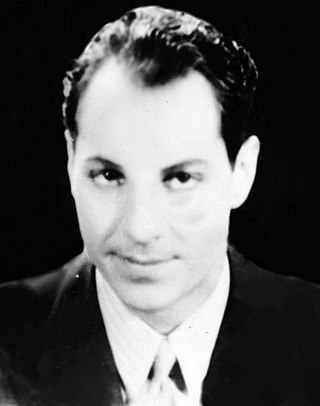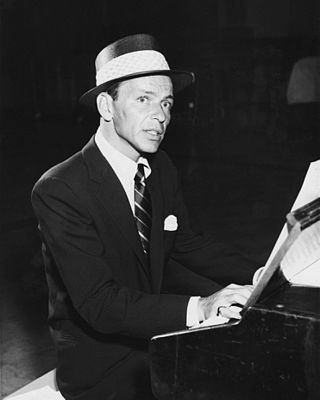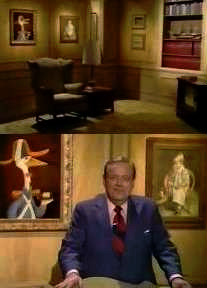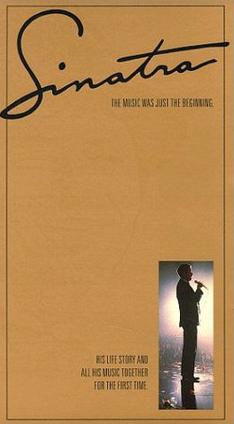
Francis Albert Sinatra was an American singer and actor. Nicknamed the "Chairman of the Board" and later called "Ol' Blue Eyes," he is regarded as one of the most popular entertainers of the mid-20th century. Sinatra is among the world's best-selling music artists, with an estimated 150 million record sales globally.

Herbert Manfred "Zeppo" Marx was an American comedic actor. He was the youngest, and last survivor, of the five Marx Brothers. He appeared in the first five Marx Brothers feature films from 1929 to 1933, and then left the act for careers as an engineer and theatrical agent.

Francis Wayne Sinatra, known professionally as Frank Sinatra Jr., was an American singer, songwriter, and conductor.

The Dean Martin Show is a TV variety-comedy series that ran from 1965 to 1974 for 264 episodes. It was broadcast by NBC and hosted by Dean Martin. The theme song to the series was his 1964 hit "Everybody Loves Somebody".
Val Anthony is an American singer and musician. He was a pianist and cabaret singer at Jilly's, a popular New York City night club in the 1960s owned by Jilly Rizzo. Frequent guests included Frank Sinatra and his Rat Pack, Dean Martin and Sammy Davis Jr. Others, like Liza Minnelli and Marilyn Monroe, also frequented the club.

Montgomery Bernard "Monty" Alexander OJ CD is a Jamaican American jazz pianist. His playing has a Caribbean influence and bright swinging feeling, with a strong vocabulary of bebop jazz and blues rooted melodies. He was influenced by Louis Armstrong, Duke Ellington, Erroll Garner, Nat King Cole, Oscar Peterson, Ahmad Jamal, Les McCann, and Frank Sinatra. Alexander also sings and plays the melodica. He is known for his surprising musical twists, bright rhythmic sense, and intense dramatic musical climaxes. His recording career has covered many of the well-known American songbook standards, jazz standards, pop hits, and Jamaican songs from his original homeland. Alexander has resided in New York City for many years and performs frequently throughout the world at jazz festivals and clubs.

Barbara Ann Sinatra was an American model, showgirl, and socialite and the fourth and last wife of Frank Sinatra.

Tom Burlinson is a Canadian-born Australian actor and singer.

Ermenegildo "Jilly" Rizzo was an American restaurateur and entertainer.
Rizzo is a surname of Italian origin, denoting a person with curly hair or a variation of the surnames Ricci and Risso.

Frank Sinatra's musical career began in the swing era in 1935, and ended in 1995, although he did briefly retire in 1971, before returning to music in 1973. Sinatra is one of the most influential music artists of the 20th century, and has sold 150 million records worldwide, making him one of the best-selling music artists of all-time. Rock critic Robert Christgau called Sinatra "the greatest singer of the 20th century". In addition to his music career, Sinatra was also a successful film actor, having won the Academy Award for Best Supporting Actor for his role as Private Angelo Maggio in From Here to Eternity (1953).

Family Classics is a Chicago television series which began in 1962 when Frazier Thomas was added to another program at WGN-TV. Thomas not only hosted classic films, but also selected the titles and personally edited them to remove those scenes which he thought were not fit for family viewing. After Thomas' death in 1985, Roy Leonard took over the program. The series continued sporadically until its initial cancellation in 2000.
"Here's That Rainy Day" is a popular song with music by Jimmy Van Heusen and lyrics by Johnny Burke that was published in 1953. It was introduced by Dolores Gray in the Broadway musical Carnival in Flanders.

Frank Sinatra had many close relationships throughout his life. He was married four times and had at least six other notable relationships in between. He had three verified children, as well as more than one of questionable paternity.

Thomas Montgomery Adair was an American songwriter, composer, and screenwriter.

Desert Memorial Park is a cemetery in Cathedral City, California, United States, near Palm Springs. Opening in 1956 and receiving its first interment in 1957, it is maintained by the Palm Springs Cemetery District. The District also maintains the Welwood Murray Cemetery in Palm Springs.

Sinatra is a 1992 CBS biographical drama miniseries about singer Frank Sinatra, developed and executive produced by Frank's youngest daughter Tina Sinatra and approved by Frank himself. Directed by James Steven Sadwith, produced by Richard M. Rosenbloom, and written by William Mastrosimone and Abby Mann. It stars Philip Casnoff, Olympia Dukakis, Joe Santos, Gina Gershon, Nina Siemaszko, Bob Gunton, and Marcia Gay Harden, with some of Sinatra's vocals recreated by Tom Burlinson. It won two and was nominated for seven Primetime Emmy Awards, along with a win and two nominations for a Golden Globe Award. Released on November 8, 1992, it was re-released on a two-disc DVD Warner Home Video on May 13, 2008.
The Racquet Club was a resort in Palm Springs, California, founded by actors Charles Farrell and Ralph Bellamy, which opened on December 15, 1934. Originally designed to include two tennis courts, it expanded to include additional courts, the "Bamboo Room" bar, bungalows, and a swimming pool.

Billy's Holiday is a 1995 Australian musical film, directed by Richard Wherrett and starring Max Cullen. Based on Cullen's real-life ability to vocally impersonate Billie Holiday, the film revolves around a man named Billy Apples, played by Cullen, whose life and music career are stagnating until he is visited by Holiday's spirit and finds himself gifted with her voice. Despite finding a receptive audience at the Cannes Film Festival and some success with international distributors, the film was negatively received in Australia and was a box office bomb.















